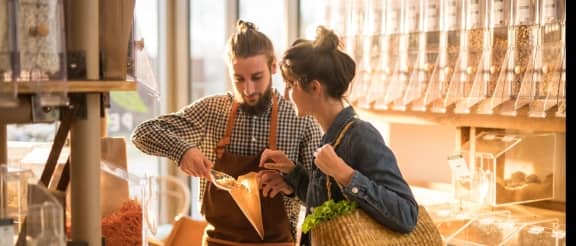KIDV continues as Verpact
November 6, 2025
Germany is a frontrunner in the field of reusable packaging and reusable systems. How has reuse developed in Germany? What can the Netherlands learn from this? On 7 June 2022, the KIDV and co-host Mehrwegverband Deutschland (German Association for Reusable Packaging) held a webinar on this topic.
You can watch the recording of the webinar via the link at the bottom of this page. Unfortunately two speakers of Biocompany and FrieslandCampina were unable to attend due to COVID-19. The KIDV thanks the speakers below for their flexibility.
"What exactly is reusable packaging?" With this question, Anika Oppermann - Chairman of the Board of Mehrwegverband Deutschland and owner Shafuto - opened the webinar. The German Packaging Act 2019 defines it as follows: (1) you can use the packaging several times for the same purpose, (2) the infrastructure allows for return and reuse and (3) there are incentives that encourage return, such as a deposit."
Oppermann: "Reuse in Germany is nothing new and has existed for over 200 years, mainly focusing on the beverage sector. In 2019, a quota was set for 70% of packaging in the beverage sector to be reusable. We are not there yet, but we are working on it. In addition, especially in recent years, we have seen an expansion into other sectors, using the existing infrastructure as much as possible. Think of: to-go, e-commerce and pre-packaged FMCG products." According to Oppermann, there are a number of success factors to simplify, expand and make the use of reusable packaging competitive. For example, there must be a functioning (digital) infrastructure and collaboration is essential.
View the presentation of Anika Oppermann (Mehrwegverband Deutschland).
Oppermann hands over the floor to Tobias Bielenstein, Director of Public Affairs, Sustainability and Communication at Genossenschaft Deutscher Brunnen and Director of Operations at Arbeitskreis Mehrweg. Bielenstein talks, among other things, about Europe's largest refillable bottle system and the Milch-Mehrweg-Pool (MMP). “When different companies and thus competitors share reusable packaging, we call this a pool. Currently, there are managed and unmanaged pools. Unmanaged pools are accessible to almost everyone, but they bring some challenges as well. For example, companies that do not know what to check for with reusable glass and accidentally bring low-quality glass onto the market. Or companies that use the wrong labels. Because of these challenges, I expect more and more pools to be managed in the near future. "
Initially, MMP was mainly used for dairy packaging, but since 2019, more and more food producers have started using the reusable jars and bottles for products such as ketchup, spreads and rice. By using the existing infrastructure, it is quickly scalable and easily accessible to SMEs. At the same time, good pool management became essential to make it work effectively."
In conclusion, Bielenstein mentions German Mineral Water Companies (GDB), Europe's largest system for refillable bottles. "With GDB we show that standardisation is not the same as uniformity. We have a wide variety of packaging within certain standards. In the coming years we will take several steps to be climate neutral by 2030."
View the presentation of Tobias Bielenstein (Genossenschaft Deutscher Brunnen).
"At SEA ME, we asked why there is such a large amount of reusable packaging for beverages and not for, say, hand soap and shampoo. We often got the answer that there is no need and that it is impossible. To prove it is possible, we founded SEA ME. After one year, there a more than 900 shops in Germany and Austria where you can return our reusable packaging for cosmetics and personal care products," says André Lang-Herfurth (Director of Marketing and Sales at SEA ME).
"The system we use at SEA ME is called Zerooo. We have recently opened up this system to the entire industry. Consumers can return packaging from Zerooo to any of the 900 participating shops. For cleaning, we use the existing infrastructure. After cleaning, the packages can be refilled with various products, such as hand soap and shampoo. With this, the cosmetics industry has the potential to become completely zero-waste," says Lang-Herfurth.
View the presentation of André Lang-Herfurth (SEA ME).
To further explore common challenges and opportunities of reusable packaging, KIDV has established the Community of Practice Reusable Packaging in 2019. It brings together parties that are working to make their packaging more sustainable by studying and implementing reusable options. Participants include supermarkets, brand owners, service providers, start-ups, knowledge institutions and NGOs. Click here for more information about the CoP Reusable Packaging.
